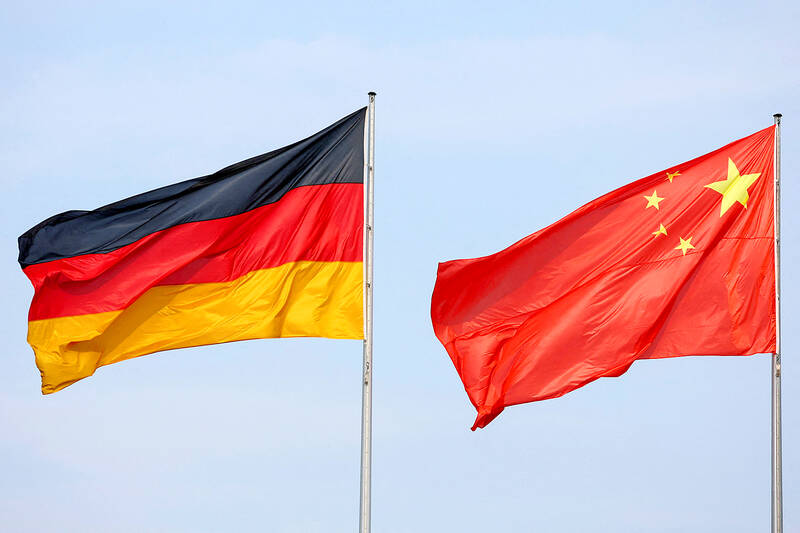Falling prices and weak demand are the main difficulties facing German companies in China, the German Chamber of Commerce said in a report yesterday, adding that European tariffs on Chinese electric vehicles (EVs) are counterproductive.
China is one of Germany’s top trading partners, accounting for a significant portion of its sales in the past few years.
However, 61 percent of 186 German companies surveyed by the business body said that “pressure on prices” is by far the biggest problem they face in China.

Photo: Reuters
Weak demand linked to the slowdown in the world’s second-largest economy and geopolitical tensions also ranked among the top concerns, the report showed.
Automakers made up 21 percent of companies surveyed.
China is the world’s largest auto market and the most advanced in terms of EV production. Dozens of Chinese EV brands have been established in recent years, supported by state subsidies.
However, China’s economic slowdown, which is weighing on consumer spending, has led to a price war between manufacturers, impacting profits. Foreign manufacturers, which have struggled to adapt to the rapid expansion of China’s EV fleet, are now also competing against Chinese vehicles on home turf.
Price pressure “is of course a result of overcapacity, but our companies are quite aligned on that — that they only can survive those times if they become more competitive,” German Chamber of Commerce executive director Maximilian Butek said at a presentation on Friday.
The EU and China are locked in a row over planned new tariffs of up to 38 percent on imports of Chinese EVs. The European Commission, which launched a probe last year into Chinese EV subsidies, has accused Beijing of unfair practices undercutting Europe’s automakers.
Germany has previously expressed concerns about applying higher tariffs, fearing reprisals for its auto giants, such as Volkswagen AG, Mercedes-Benz AG and BMW AG, which are heavily invested in China.
“Tariffs as suggested now by the EU will not increase the competitiveness of the automotive industry,” Butek said.
“Therefore, we [would] rather advocate for investing into the competitiveness of the European Union, rather than trying to protect the auto industry,” he said, adding that German makers are “dependent” on the Chinese market.
German Minister for Economic Affairs and Climate Action Robert Habeck is to visit China this week for talks on economic ties between the two countries, with his spokesperson saying that the minister “will not be able to avoid addressing” the issue of EU tariffs.

When an apartment comes up for rent in Germany’s big cities, hundreds of prospective tenants often queue down the street to view it, but the acute shortage of affordable housing is getting scant attention ahead of today’s snap general election. “Housing is one of the main problems for people, but nobody talks about it, nobody takes it seriously,” said Andreas Ibel, president of Build Europe, an association representing housing developers. Migration and the sluggish economy top the list of voters’ concerns, but analysts say housing policy fails to break through as returns on investment take time to register, making the

EARLY TALKS: Measures under consideration include convincing allies to match US curbs, further restricting exports of AI chips or GPUs, and blocking Chinese investments US President Donald Trump’s administration is sketching out tougher versions of US semiconductor curbs and pressuring key allies to escalate their restrictions on China’s chip industry, an early indication the new US president plans to expand efforts that began under former US president Joe Biden to limit Beijing’s technological prowess. Trump officials recently met with their Japanese and Dutch counterparts about restricting Tokyo Electron Ltd and ASML Holding NV engineers from maintaining semiconductor gear in China, people familiar with the matter said. The aim, which was also a priority for Biden, is to see key allies match China curbs the US

NOT TO WORRY: Some people are concerned funds might continue moving out of the country, but the central bank said financial account outflows are not unusual in Taiwan Taiwan’s outbound investments hit a new high last year due to investments made by contract chipmaker Taiwan Semiconductor Manufacturing Co (TSMC, 台積電) and other major manufacturers to boost global expansion, the central bank said on Thursday. The net increase in outbound investments last year reached a record US$21.05 billion, while the net increase in outbound investments by Taiwanese residents reached a record US$31.98 billion, central bank data showed. Chen Fei-wen (陳斐紋), deputy director of the central bank’s Department of Economic Research, said the increase was largely due to TSMC’s efforts to expand production in the US and Japan. Investments by Vanguard International

The popular Taiwan Semiconductor Manufacturing Co (TSMC, 台積電) arbitrage trade might soon see a change in dynamics that could affect the trading of the US listing versus the local one. And for anyone who wants to monetize the elevated premium, Goldman Sachs Group Inc highlights potential trades. A note from the bank’s sales desk published on Friday said that demand for TSMC’s Taipei-traded stock could rise as Taiwan’s regulator is considering an amendment to local exchange-traded funds’ (ETFs) ownership. The changes, which could come in the first half of this year, could push up the current 30 percent single-stock weight limit